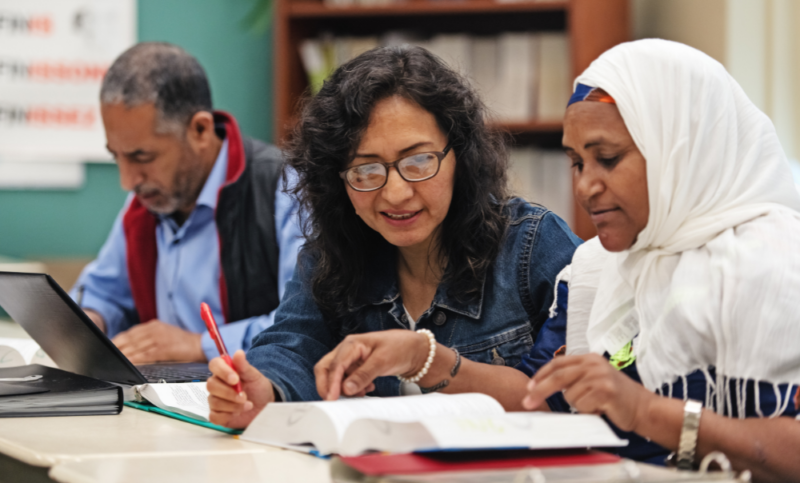
Off-the-Shelf Training Sessions
These are our existing training sessions that are delivered as a closed session for your team only.
Our Off-The-Shelf training sessions are a brilliant opportunity to further your team or organisation’s knowledge and build confidence in handling scenarios or conversations where sexual violence may be at the centre.
Whether you are a team of frontline professionals, educators, managers, students, or even just looking to further your knowledge around sexual violence and/or supporting survivors for personal or professional reasons, there is something for everyone. Training can be delivered virtually and in-person.
What’s included?
- First-rate training delivered by experienced trainers accredited by both Rape Crisis England and Wales and The Survivors’ Trust.
- Opportunity to explore sensitive topics with the guidance of frontline professionals.
- Personal certificate of completion for all attendees.
“The training was excellent...There was the right balance of listening, and partaking in break-out rooms/ discussions. It is clear that Survivors’ Network are intersectional, trauma informed and client centred, and their expertise was accessible and well received. I would highly recommend this training.”
Attendee feedback from our Sexual Violence & The Legal System training session



Session Overviews: Our Standard Packages
Sexual Harassment and The Workplacetoggle accordion content
This training has been designed to develop participants’ knowledge and understanding of sexual harassment in the workplace. The session will offer participants the opportunity to explore what sexual harassment might look like, the impacts that sexual harassment has and the ways we can challenge sexual harassment in the workplace. The session will also make some time to consider the ways all staff can support each other to work towards a more positive workplace culture.
Learning Objectives:
01 What is sexual harassment?
02 Understanding the impacts of sexual harassment.
03 Bystander Intervention and tools for challenging workplace harassment.
04 Practical tips for supporting a survivor of harassment.
05 Tips for creating a positive workplace culture.
Who is this course for?
Any workplace that is looking to champion a safe and positive workplace culture.
Course Duration
2.5 Hours (enquire for pricing)
Sexual Violence and The Legal Systemtoggle accordion content
This training day has been designed to develop participants’ knowledge and understanding of our legal system in relation to matters such as childhood sexual abuse and sexual violence, and what may arise when someone has reported such a crime to the police.
The session will offer participants the opportunity to explore the criminal justice journey, as well as begin to consider the barriers which many groups may face when interacting with this system.
At Survivors’ Network we offer specialist independent support to survivors throughout the criminal justice process, so we are able to offer unique, trauma-informed insights to what can be unfamiliar and sometimes seemingly complex processes.
Learning Objectives:
- Understand the law concerning sexual offences.
- Understand options of reporting such crimes to the police.
- Understand what happens in the criminal justice system.
- Understand the effects of the criminal justice system on survivors of sexual offences.
- Learn about possible supportive measures available.
Who is this course for?
The course is for anyone wanting to learn more about the way in which the systems in place respond to survivors of rape and sexual assault, and how these crimes may be dealt with.
This may include frontline staff working with clients including healthcare professionals, social workers, frontline workers including benefit, welfare and housing staff, youth workers, education staff, therapists, counsellors, people working in the voluntary sector, or those operating in such fields at management level.
Course Duration
Half Day (3.5 Hours)
Self-Care and Vicarious Traumatoggle accordion content
This training day has been designed to develop participants’ knowledge and understanding of vicarious trauma, secondary trauma, compassion fatigue and burnout.
We will explore the signs and symptoms of each and the impact they can have on us as individuals, as well as on our work and workplace.
We will discuss the benefits of self-care; the barriers to self-care; the various forms self-care might take. Participants will have the opportunity to learn stress management techniques and develop their own personal self-care kit.
Learning Objectives:
- Gain a basic understanding of the impact of trauma on our brain.
- Understand the signs and causes of vicarious trauma, secondary trauma, compassion fatigue and burnout.
- Learn about the importance of boundaries.
- Explore a variety of self-care and resilience building tools and techniques.
- Develop a personal self-care plan to use in your daily home and work life.
Who is this course for?
The course is for anyone wanting to learn how those in helping roles might experience compassion fatigue or vicarious trauma and how to start considering managing the impact of stress using self-care strategies.
This may include; frontline staff or volunteers, healthcare professionals, social workers, teacher and education staff, family workers, benefit, welfare and housing staff, youth workers, therapists, managers and those supporting staff, counsellors and people working in the voluntary sector.
Course Duration
Option to be delivered as a half day (3.5 hours) or a full day (7 hours).
First Disclosurestoggle accordion content
People working directly with the general public may at some point be the person that a survivor of sexual assault first talks to about their abuse.
Would you or members of your team know how to react / what to say / what not to say / what your legal duty is / where to signpost?
This course gives an overview of what to do when a person first discloses an incident or history of sexual abuse as well as practical advice about how to support an individual disclosing abuse.
Learning Objectives:
- Develop a greater awareness of issues relating to sexual violence.
- Improve understanding of how trauma affects the brain.
- Increase confidence and ability in taking a first disclosure and offering advice to those who have experienced sexual violence.
Who is this course for?
All frontline staff working with clients including healthcare professionals, social workers, frontline workers including; benefit, welfare and housing staff, youth workers, education staff, therapists, counsellors, legal and court staff, police officers, prison service, people working in the voluntary sector, strategic managers and decision makers.
Course Duration
Half Day (3.5 Hours)
Impact of Sexual Violence and Abusetoggle accordion content
The impact of rape and sexual assault is varied and complex. Individuals react in different ways at different times and in the same way that no two people are the same, each person who has experienced sexual violence will react in a different way.
Learning about the impact of rape and sexual assault will help anyone working with or supporting a survivor to gain a better understanding about what they may be experiencing.
This course helps to challenge myths surrounding expected reactions to rape and sexual assault, and to understand the processes at play that may bring about different responses and reactions, in the moment and afterwards.
We will go on to consider some practical ways in which we may respond, support that is available locally and nationally, and move on to reflect on the impact that supporting someone who has been through these experiences can have on us.
Learning Objectives:
- Define sexual violence and abuse.
- Explore myths about rape and sexual violence and/or abuse.
- Describe trauma and its impact.
- Describe the impact of sexual violence and abuse on the health and wellbeing of the survivor.
- Identify and implement support measures for survivors.
- Explain what services and support are available in the city.
- Identify own needs as a supporter.
Who is this course for?
Anyone who wants to know more about how rape or sexual violence impacts people, for personal or professional reasons.
This course is intended to offer an introductory understanding of sexual violence and the impact of this, and will provide a good foundation to further learning.
Course Duration
Half Day (3.5 Hours)
Supporting Survivors In Higher Education: Basic Awareness – Level 1toggle accordion content
This training course pulls together key aspects of our core training packages to introduce participants to the varied ways that rape and sexual assault can impact on an individual, to help anyone working with or supporting a survivor to gain a better understanding of what they may be experiencing.
There will be moments of particular focus on the impact on students who have experienced sexual assault or abuse.
Learning Objectives:
- Define sexual violence and abuse.
- Describe the long and short term effects of sexual violence.
- Explore sexual violence in a Higher Education setting.
- Learn practical tips for supporting someone who has experienced sexual violence.
- Identify support available for survivors.
Who is this course for?
We believe that all staff working in an HE or FE context should have a foundational understanding of sexual violence, since they are likely interacting with survivors. This course is aimed at anyone working in that setting and provides that foundation.
Course Duration
Half Day (3.5 Hours). This can be delivered as a standalone session or works well when paired with the Level 2 session to be delivered over a full day.
Supporting Survivors In Higher Education: Deepening Understanding – Level 2toggle accordion content
This training course could either be attended as a stand-alone session, or could be attended following completion of the Level 1 Basic Awareness course.
This course pulls together key aspects of our core training packages and combines them with specialist focus on survivors in a Higher Education setting.
The course aims to think more deeply about what makes an effective response process in a Higher Education setting and explores how to take a first disclosure.
Learning Objectives:
- Explore what makes an effective response to sexual violence.
- Understand reporting options available.
- Explore ways to respond to first disclosures effectively.
- Explore a variety of grounding techniques.
Who is this course for?
This course is aimed at support staff in the HE setting who may work with survivors of sexual violence, or who may be likely to receive a first disclosure.
Course Duration
Half Day (3.5 Hours). This can be delivered as a standalone session or works well when paired with the Level 1 session to be delivered over a full day.
Consent in Universitiestoggle accordion content
This workshop aims to introduce conversations around consent, sexual relationships and sexual violence to university students.
Learning Objectives:
- Definitions of Consent
- Understanding Consent
- Consent in Action
- Bystander Intervention
- Support Available
Who is this course for?
Any students of university age who would benefit from a deeper understanding of conversations around consent and healthy sexual relationships.
Course Duration
90 Minutes
We also have a consent webinar designed to be distributed to whole student cohorts. For more info, visit our Webinar Training Sessions page.
Bystander Interventiontoggle accordion content
Our Bystander Intervention training helps services, businesses and the public to safely intervene in situations of sexual harassment/assault. This course provides participants with the skills to recognise and challenge misogynistic behaviour in everyday life.
Learning Objectives:
- What is sexual harassment and misogyny?
- What are the impacts of sexual harassment and misogyny?
- Learn and practice tools to challenge this behaviour.
Who is this course for?
This training would be beneficial for anyone. Sexual harassment and misogyny are daily encounters for so many – but we can make our communities safer by knowing the right way to intervene when we need to, and being able to empathise with and support those affected by it.
Course Duration
90 Minutes
Standard Pricing Structure:
Rate: |
Full Day |
Half Day |
1/1.5 Hour |
Full rate(private sector, including private education, |
£1,415 |
£710 |
£350 |
50% subsidy(statutory sector, NHS, state schools, |
£710 |
£350 |
£225 |
Session Overviews: Our Specialist Packages
Pre-Trial Conditionstoggle accordion content
The term ‘pre-trial’ therapy refers to therapy in which the client has an open police investigation that may lead to a criminal trial. Following pre-trial therapy guidelines is essential when supporting clients, so as to not adversely affect the outcome of their court case.
Public discourse around sexual and domestic violence, such as the #MeToo movement, has led to an increase in reports to the police and involvement in the criminal justice system. An awareness of pre-trial therapy guidance has never been more relevant to therapists and professionals supporting vulnerable people.
Learning Objectives:
- Explore key issues related to supporting pre-trial clients.
- Increase understanding of the criminal justice system, in relation to vulnerable witnesses.
- Challenge misconceptions that can create barriers for pre-trial clients.
- Share tools and techniques to help us work more effectively with pre-trial clients.
Who is this course for?
Any counsellor/psychotherapist or professional working in a support role, particularly where clients are likely to be involved in the criminal justice system.
Essential for those supporting survivors of sexual or domestic violence.
Course Duration
Full Day (7 Hours)
Trauma and The Braintoggle accordion content
The experience and impact of trauma are not widely understood, which often leads to myths and misunderstandings in society, with significant implications for how this is lived and perceived.
Individuals who experience traumatic events will react in different ways.
The knowledge of the underlying mechanisms and structures will be a powerful tool in supporting someone who has experienced trauma, with ample research showing the impact of psycho-education on wellbeing and ability to cope.
Learning Objectives:
- Explore key issues related to the experience of trauma.
- Increase understanding of the physiology of the traumatic experience.
- Understand how the perception of trauma impacts functioning.
- Share information, tools and resources that may assist in supporting clients.
Who is this course for?
The course is ideal for anyone wanting to learn more about psychological trauma, understanding the physiological mechanisms operating when we experience trauma, how our brain and body process it, as well as the implications in the development of traumatic symptomatology.
It is relevant for anyone working with clients who have experienced trauma, with the goal of using this knowledge to understand the impact this may have had and supporting these clients.
Course Duration
Half Day (3.5 Hours)
Specialist Pricing Structure:
Rate: |
Full Day |
Half Day |
|
Full rate(private sector, including private education, |
£2,260 |
£1,125 |
|
50% subsidy(statutory sector, NHS, state schools, |
£1,125 |
£560 |
|
Can’t find what you’re looking for?
Are you looking for training that’s not listed? Perhaps you’d like to combine elements of different sessions, content tailored to a particular cohort, or something totally unique to work around the needs of your organisation/team?
Visit our Bespoke Training and/or Consultancy Service pages to find out more, and/or get in touch to discuss things further. We are always happy to pencil in a phone call.
If you have a limited budget, please don’t hesitate to get in touch so we can discuss this. We may be able to offer a reduction.















